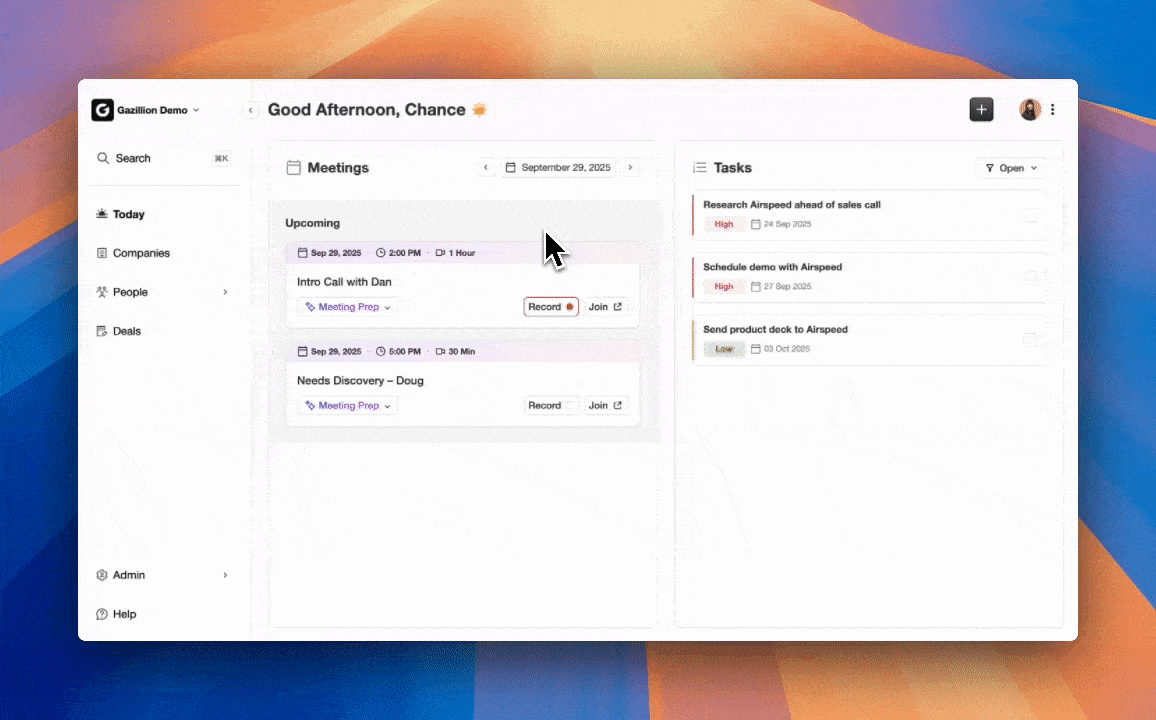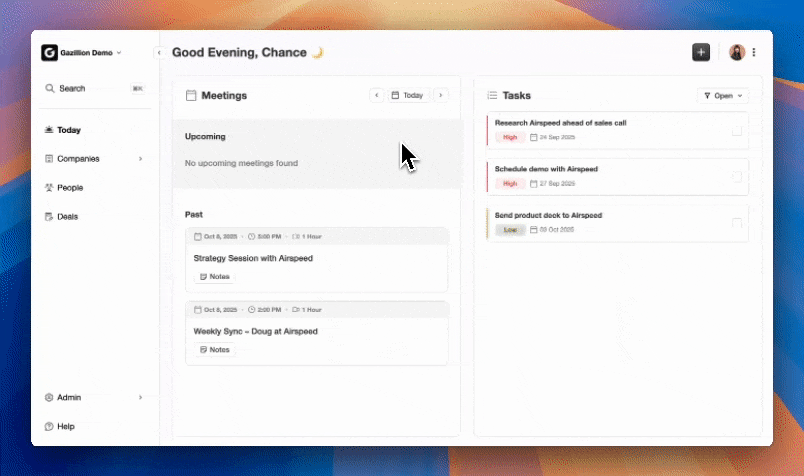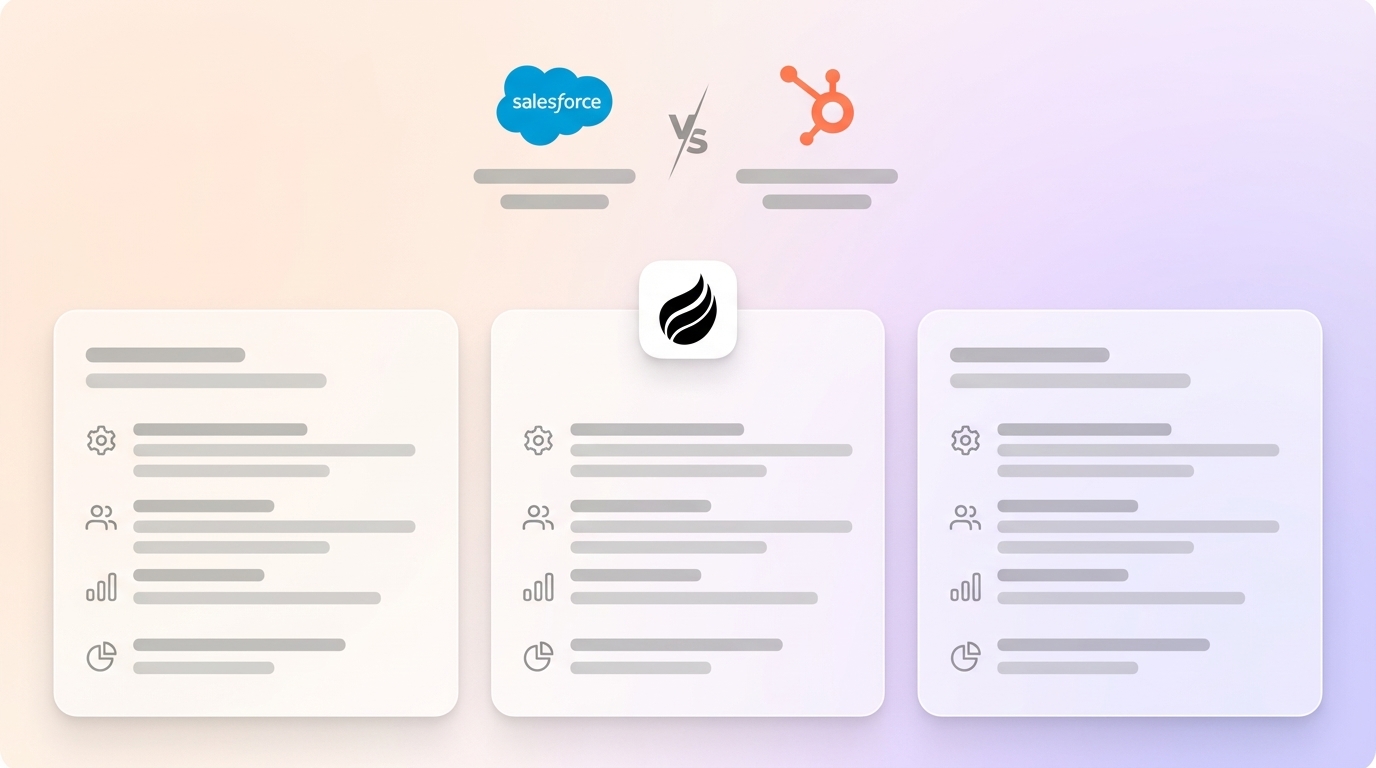Last updated: February 8, 2026
Key Takeaways for Mid-Market CRM Buyers
- Salesforce and HubSpot both rely on heavy manual data entry, costing reps 5+ hours weekly and limiting selling time to about 35%.
- Salesforce offers deep customization but carries a high total cost of ownership ($120k+/year) and legacy complexity. HubSpot is easier to set up but has scalability limits and a clunky interface.
- Coffee’s AI agent automates data entry, enrichment, and pipeline intelligence, saving 8-12 hours per rep weekly in standalone or companion modes.
- Legacy CRMs struggle with unstructured data and AI ROI, with a 33% failure rate on AI initiatives, while Coffee delivers proactive revenue intelligence.
- Upgrade CRM productivity by getting started with Coffee today and deploying autonomous sales automation.
Salesforce vs HubSpot vs Coffee: Mid-Market CRM Showdown
Salesforce delivers deep customization for complex workflows, and HubSpot offers faster setup with integrated marketing tools. Both platforms still depend on manual processes that slow down growing sales teams and reduce selling time.
|
Category |
Salesforce |
HubSpot |
Coffee (AI Agent) |
|
Data Entry |
Manual grind (60-67% non-selling time) |
Manual grind (contact limits, no automation in base) |
Autonomous, auto-creates, and enriches from email and calendar |
|
TCO/Scalability |
High ($120k+/yr mid-market plus add-ons) |
Hidden escalations, 30-40% less but restrictive |
Seat-based pricing, 8-12 hours per rep saved weekly |
|
AI/Automation |
Agentforce, 33% ROI fails due to poor data |
Breeze, limited sales depth |
Proactive agent with pipeline intelligence and meeting orchestration |
|
Adoption/Data Quality |
Low adoption, 53% cite poor data as a barrier; shadow CRMs are common |
Clunky UX and scalability limits |
High adoption, handles unstructured data and data warehouse inputs |
The core limitation for both Salesforce and HubSpot starts with their architecture. 64% of Salesforce customers cite modernization of legacy systems as their biggest roadblock, while HubSpot’s clunky interface drives frequent reliance on customer support, which disrupts daily workflows.
Salesforce carries more than 25 years of legacy baggage. HubSpot started as a marketing platform and later bolted on CRM capabilities. Neither platform was designed as a unified intelligence system that can handle the unstructured data driving modern sales, such as email threads and call transcripts. This limitation forces teams into manual workarounds that compound over time and erode productivity.
Coffee’s AI Agent CRM: Fixing Legacy Salesforce and HubSpot Gaps
Coffee breaks the “bad data in, bad data out” cycle that holds Salesforce and HubSpot back. The platform follows a simple rule: software should do the work, not just store activity logs.
Coffee offers two deployment models that match different team realities:
- Standalone CRM: Ideal for small companies with 1-20 employees that want a modern system from day one. The AI agent automatically creates contacts, builds prospect lists, and manages the full sales workflow without manual data entry.
- Companion App: Built for small to mid-market teams that stay on Salesforce or HubSpot. The agent becomes an intelligent layer that unifies data from tools like email and calendar, then writes clean, structured insights back into the existing CRM.

Coffee stands apart from legacy systems through several key capabilities. It enriches contacts automatically from email and calendar data. It generates AI-powered meeting briefings and summaries. It offers Pipeline Compare for week-over-week analysis and supports natural language list building. The agent processes unstructured data such as email text and call transcripts, which traditional CRMs struggle to handle due to rigid relational database designs.

The 2026 AI advantage shows up clearly when you compare architectures. AI agents now move from taking tasks to owning outcomes and proactively coordinating people, processes, and data. Coffee uses a proactive data warehouse approach instead of the passive databases that power Salesforce and HubSpot.
Get started with Coffee and deploy an AI agent that turns your CRM from a manual database into an autonomous revenue intelligence system.
Real-World Use Cases, TCO Breakdown, and Time Savings
Growing startups that still manage sales in spreadsheets can adopt Coffee’s standalone model and skip complex CRM setup. They gain enterprise-grade intelligence with automatic contact creation, enrichment, and pipeline visibility from day one.

Small to mid-market companies that already use Salesforce but struggle with adoption can deploy Coffee’s companion app. The agent removes data fragmentation across tools, improves data quality inside Salesforce, and reduces the need for manual updates.
Total cost of ownership tells a similar story. 62% of Salesforce customers worry about unpredictable AI costs, and HubSpot pricing grows restrictive as teams scale into higher tiers. Coffee offers simple seat-based pricing that includes unlimited agent labor and saves 8-12 hours per rep every week.
CRM Decision Guide: When Coffee Beats Legacy CRMs
|
If… |
Legacy Fit |
Coffee Wins |
|
Manual entry kills productivity |
Teams tolerate time drains and admin work |
Agent automates data entry end-to-end |
|
Teams need reliable AI insights |
Poor data quality produces weak outputs |
High-quality data in and accurate insights out |
|
Mid-market TCO is a concern |
Costs run high and escalate with add-ons |
Predictable, low, seat-based pricing |
FAQs: Salesforce, HubSpot, and Coffee in 2026
Why are companies leaving Salesforce?
Companies leave Salesforce because ROI on AI investments often disappoints and legacy complexity slows progress. Only 33% of AI initiatives meet targets despite heavy spending. At the same time, 64% of customers cite legacy system modernization as their biggest roadblock, and 62% worry about unpredictable costs.
The 25-year-old architect struggles with modern data requirements. Only 26% of executives report having most customer data inside Salesforce, which leads to fragmented views and shadow systems. Sales productivity has declined, with quota attainment dropping from 44% in 2019 to 28% in 2023, while reps still spend 60-67% of their time on non-selling work.
What are the HubSpot disadvantages for sales?
HubSpot’s main disadvantages for sales teams involve scalability limits, hidden costs, and workflow friction. Pricing increases quickly as businesses grow, since advanced scalability requires higher tiers.
The free and starter plans cap teams with a 1,000 contact limit and a single deal pipeline, which does not support serious growth. The interface can feel clunky, so teams often rely on customer support, which interrupts daily work. Advanced features require steep learning curves, and larger organizations may find that HubSpot cannot support complex sales processes.
Will AI replace Salesforce?
AI agents are reshaping the CRM market and exposing Salesforce’s weaknesses, while also creating new alternatives. The shift from passive databases to active agents changes expectations, since software now performs work instead of only storing records.
Coffee’s AI agent model shows how modern CRM should behave. The agent handles data entry, enrichment, and analysis while surfacing proactive insights for reps and managers. Traditional CRMs like Salesforce will likely remain in large enterprises that need deep customization. AI-native platforms will become the preferred choice for companies that value productivity and data quality more than legacy feature depth.
What is the best Salesforce alternative for mid-market teams?
For mid-market companies, Coffee is a strong Salesforce alternative because it solves the root problems that push teams away from legacy CRMs. Most alternatives simply change the interface while keeping manual processes in place. Coffee’s AI agent removes the data entry burden instead of repackaging it.
The platform offers flexible deployment as a standalone CRM for teams that want a clean slate or as a companion app that upgrades existing Salesforce instances. This flexibility lets mid-market teams improve data quality, increase user adoption, and lower total cost of ownership while still protecting current tech stack investments when needed.
Conclusion: Move Beyond Manual CRMs and Deploy Coffee’s AI Agent
The Salesforce versus HubSpot decision often feels like a forced choice between two similar problems. Both platforms rely on humans to maintain data quality at a time when AI agents can handle repetitive work. Salesforce delivers deep customization with high cost and complexity. HubSpot offers easier setup but struggles with scale and usability. Both keep teams stuck in manual workflows that drain productivity and weaken data integrity.
Coffee’s AI agent points to the future of CRM with autonomous data management, proactive insights, and real productivity gains. Whether you choose the standalone model or use Coffee as a companion to your existing system, you gain an always-on agent that protects data quality and delivers accurate insights.
Get started with Coffee today and see how your CRM performs when it becomes an autonomous revenue intelligence system instead of a manual database.
